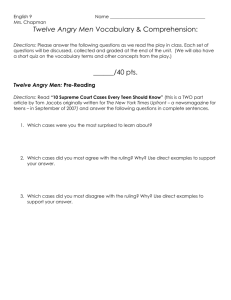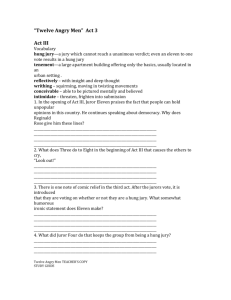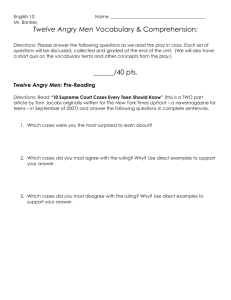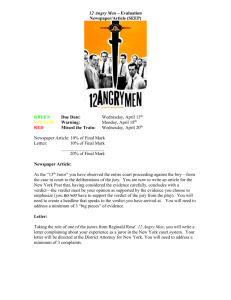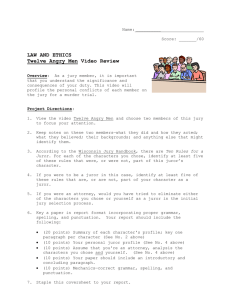Examples
advertisement
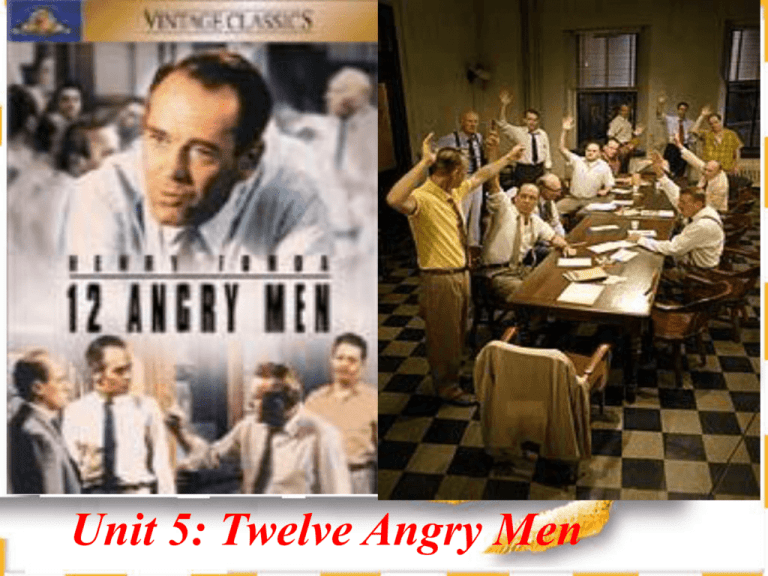
Unit 5: Twelve Angry Men Teaching objectives • • • • • 1. Introduction to the Text 2. Detailed Discussion of the Text 3. Vocabulary: Verb: dress, score, strain; Noun: focus; Phrase: but for 4. Grammar Focus: Sentence analysis; Where-clauses; Inversion; Verb forms 5. More work on the Text: Oral Work; Vocabulary; Grammar; Written Work (Chinese-English Translation) Arrangements Pre- reading While- reading After- reading Pre – reading Warming- up questions Background information Warming-up questions • 1. Can you give examples about the people who have once got involved in law cases? • 2. How much do you know about American law? The first person • • • • • 赖昌星 45 years old 远华 Group Smuggling 30 billion yuan (1996 – 1999) Canada The second person • 赵燕 • being beaten by two American policemen without reason • time: 21st, July, 2004 • During a travel • the result of the case innocent civil case The third person • 赵本山 • 2nd, March, 2007 • NewYork • “刘老根” Art Corps • Illegal profits: giving- back tickets no seats • Being asked for 1 million dollars for compensation Unit 5 Twelve Angry Men Lesson 5 – Twelve Angry Men Background information I. American Court System II. Jury System & Jurors III. Jury Procedure IV. Civil Case vs. Criminal Case V. Trial Pattern: Key Words Some books for Law Lesson 5 – Twelve Angry Men American Court System The accused is deemed innocent until and unless proved “guilty beyond a reasonable doubt”; In most cases, the verdict has to be unanimously reached. A trial does not aim at discovering who committed a particular crime, but rather the innocence or guilt of the accused; The system is valuable, but not infallible and can be quite precarious. The end of American Court System. Lesson 5 – Twelve Angry Men Jury System & Jurors A jury is made up of 12 adults. Jury service is usually compulsory To be continued on the next page. Lesson 5 – Twelve Angry Men Jury System & Jurors How long does jury service last for? Around two weeks, however, if at the end of this time the trial is still going, you may be asked if you are able to stay on. Who can I talk to about the trial? Once you are a juror you may only discuss the trial in the jury room when all the jury are present. You must not talk about the trial to anyone who is not a member of your jury. It is an offence for anyone to impersonate a juror and to serve on his or her behalf. To be continued on the next page. Lesson 5 – Twelve Angry Men Jury Procedure What happens after all of the evidence is presented? After all of the evidence is presented, the lawyers make closing arguments. The judge then gives the “charge”, or instructions, to the jury. In these instructions, the issues that jurors must decide are defined. When the judge has finished, the jurors retire to the jury room to deliberate the case. To be continued on the next page. Lesson 5 – Twelve Angry Men Jury Procedure How is voting conducted by the jurors? Your final vote should represent your own opinion. When differences of opinion arise between jurors, the jurors should say what they think and why they think it. jurors must not try to force agreement. Jurors should not refuse to listen to the arguments and opinions of others and must not permit any decision to be reached by chance or the “toss of a coin”. To be continued on the next page. The first four steps • • • evidence presenting • • • Judge’s instructions closing arguments jurors’ deliberation of the case Lesson 5 – Twelve Angry Men Jury Procedure What should a jury do once it has reached a verdict? Once the jury has reached its verdict, the presiding juror completes and signs the verdict form. The judge will provide instructions explaining the verdict form. Once the verdict form is signed, the presiding juror should inform the bailiff or clerk. The entire jury panel will then re-enter the courtroom and deliver its verdict in open court. The end of Jury Procedure. The full juror procedure • • • • • • • • • • evidence presenting closing arguments Judge’s instructions jurors’ deliberation of the case presiding juror filling the verdict form delivering the verdict form openly Lesson 5 – Twelve Angry Men Civil Case vs. Criminal Case A civil case is one in which a person who feels he or she has been wronged brings legal action in order to protect his or her interests. This person is known as the plaintiff. The person being sued is known as the defendant. _ _ _ _ People usually sue for an amount of money to make up for the injury or loss they have suffered. Civil cases do not result in prison terms. To be continued on the next page. Lesson 5 – Twelve Angry Men Civil Case vs. Criminal Case A criminal case, on the other hand, is one in which the local, State, or Federal Government begins the action in the name of its citizens. The plaintiff is the government acting on behalf of the people. To be continued on the next page. Lesson 5 – Twelve Angry Men Civil Case vs. Criminal Case –Differences In a civil case, it is up to the plaintiff, the person who has started the lawsuit, to prove his or her case with stronger evidence than the defendant. In other words, the judge or jury must believe that the weight of the plaintiff's evidence is greater than the weight of the defendant's evidence, if the plaintiff is to win. In a criminal case, because a person is presumed to be innocent until proven guilty, the prosecution must prove the case beyond a reasonable doubt. This is a much heavier burden of proof than there is in a civil case. Lesson 5 – Twelve Angry Men Trial Pattern: Key Words:1 Not-Guilty Plea: When a defendant enters a plea of not guilty, the case proceeds to trial. The jury is selected, 12 people plus alternate jurors if the trial is expected to be long. To be continued on the next page. Trial Pattern: Key Words:2 • Presentation of Evidence: Each side then has a turn to present evidence, which can be pictures, objects, documents, or sworn testimony by witnesses. Evidence must have a tendency to prove or disprove the issues in the case. The judge decides if evidence is unreliable based on evidence rules. The evidence rules are intended to ensure that the evidence is reliable. Lesson 5 – Twelve Angry Men Trial Pattern: Key Words:3 Objections: During a trial, if attorneys on either side feel that a question asked or evidence offered is improper, they may make objections. W B T L E Trial Pattern: Key Words:4 Verdict: The judge will instruct the jury on the law that applies to the case. The jury then moves to the jury room to reach a verdict. All 12 jurors must agree on a guilty verdict. If the jury reaches a guilty verdict in a felony case, the judge will order a probation report and schedule a sentencing hearing for 20 days later. A misdemeanor can be sentenced immediately. Lesson 5 – Twelve Angry Men Trial Pattern: Key Words:5 Sentences: State and local laws define crimes and specify punishment. The end of Trial Pattern. While- reading • Text appreciation • Language study Text appreciation Plot of the story Setting of the story Protagonists of the story Theme of the story Plot: A young delinquent awaits sentencing for the manslaughter of his aggressive father. One juror feels there is a reasonable doubt—to the frustration of his eleven colleagues—thus preventing a quick verdict. During the heated deliberations, the hidden preconceptions and prejudices of the jurors are revealed. Setting: jury room Protagonists: 12 jurors To be continued on the next page. Sentence Paraphrase 1 Now you fellows can handle this any way you want. (Para. 2) Adverbial clause of manner “This” refers to the deliberation of the jurors. Notice the difference between “any way” and “anyway”. -He may not like to see me, but I’m going anyway. -You can do it any way you want. I don’t care. I just want the result. -He is desperate. He has to find that money any way. Sentence Paraphrase 2 Now we know where we are. (Para. 5) Now we know what everybody’s attitude is. Lesson 5 – Twelve Angry Men Word Study 4. charge v. a. to state officially that someone may be guilty of a crime 指控 b. to ask someone for a particular amount of money for something you are selling 付费 Examples: Gibbons has been charged with murder. The gallery charges an entrance fee. Lesson 5 – Twelve Angry Men charge sb. with 以……的罪行 指控 to state officially that someone may be guilty of a crime Examples: The man they arrested last night has been charged with murder. They're going to charge him with dangerous driving. Cf. He was accused of murder. Smith accused her of lying. Sentence Paraphrase 3 You know, (he was)born in a slum, his mother (was) dead since he was 9, (and he)lived a year and a half in an orphanage when his father was serving a jail term for forgery. (Para. 19) Ellipsis In spoken English, elliptical sentences are common. go to 4 Lesson 5 – Twelve Angry Men 在监狱服刑 serve a jail term/sentence, serve time to spend a particular period of time in prison Examples: He served an eighteen-month sentence for theft. Did you know that Les is serving time (= is in prison) ? Lesson 5 – Twelve Angry Men 3. owe sb. sth 欠某人…… to feel that you should do something for someone or give someone something To be continued on the next page. Lesson 5 – Twelve Angry Men Examples: I owe my brother $50. He asked for help from a colleague who owed him a favour.. You owe him an apology. “I owe my parents a lot,” he admitted. Their success owes more to good luck than to careful management. Lesson 5 – Twelve Angry Men Paragraph 20 4. be supposed to do 本应该…… used should to say or what should someone not do, especially because of rules or what someone in authority has said To be continued on the next page. Lesson 5 – Twelve Angry Men Examples: We're supposed to check out of the hotel by 11 o'clock. I'm not supposed to tell anyone. No one was supposed to know about it. The meeting was supposed to take place on Tuesday, but we've had to postpone it. Sentence Paraphrase 4 What do you think that trial cost? (Para. 20) According to the U.S. law any citizen has a right to a proper trial, and if he can’t pay, the trial will be paid by the government. That’s why No. 10 here reminds No. 8 angrily that the boy has cost a lot of public money. go to 5 Sentence Paraphrase 5 Since when is dishonesty a group characteristic? (Para. 21) I’m surprised to hear you say that as if dishonesty has ever been a group characteristic. This is a retort to No. 10’s remark from No. 9 who is opposed to stereotyped opinions about the poor people. go to 6 Lesson 5 – Twelve Angry Men Paragraph 23 5. mix up 搞混淆 to make the mistake of thinking that someone or something is another person or thing Examples: I must have got the times mixed up. I always mix him up with his brother. They look so much alike. Lesson 5 – Twelve Angry Men Translation 6. put into words v. to express 用语言来 表达 婉转地讲 Examples: It is hard to put into words how I feel now. Sentence Paraphrase 7 Translation Innocent until proven guilty. The burden of proof is on the prosecution. (Para. 27) 没有证明有罪, 就算无辜。举 证的责任在指 控的一方。 The accused is not guilty unless we prove him guilty. And it is the prosecutor’s responsibility to present the evidence. go to 8 Lesson 5 – Twelve Angry Men Paragraph 29 10. refute v. to prove that a statement or idea is not correct refute a hypothesis/a claim/an idea, etc. 反驳一个假设/说法/想法 Lesson 5 – Twelve Angry Men Paragraph 33 13. swear v. (swore, sworn) a. to use rude and offensive language 诅咒 b. to say very strongly that what you are saying is true 发誓 Examples: Don't swear in front of the children. I never touched your purse, I swear! Sentence Paraphrase 8 You don’t believe the boy’s story. How come you believe the woman’s? She’s one of THEM, too, isn’t she? (Para. 36) Those people who live in slums How is it that…? Why…? No. 8 is pointing out a flaw in No. 10’s logic. No. 10 first says that you can’t believe those slum people, then he begins to quote of those people’s testimony, but he is not aware of his self-contradiction. go to 9 Sentence Paraphrase 9 You are a pretty smart fellow, aren’t you? (Para. 37) This is a real fine boy. (Para. 49) Notice the ironic tone when two jurors say them, then put into appropriate Chinese. go to 10 Writing Devices Irony the discrepancy between what is said and what is meant, what is said and what is done. origin “Irony” comes from the Greek word “eiron,” meaning a man who makes himself appear less than he is. To be continued on the next page. Lesson 5 – Twelve Angry Men Paragraph 46 8. practically ad. a. almost b. in a sensible way which takes account of problems Examples: It's practically impossible to predict what will happen. “But how can we pay for it?” said John practically. Lesson 5 – Twelve Angry Men Paragraph 46 9. provoke v. a. to make someone angry, especially deliberately 激怒 Examples: Her rudeness provoked me to strike her. Paul tried to provoke Fletch into a fight. Sentence Paraphrase 10 It may have been two too many. Everyone has a breaking point. (Para. 47) “The last straw on camel’s back” Subjunctive mood These two slaps may have been beyond his limit of endurance. The boy has been kicked around so often that he may have been reaching the breaking point when the two slaps come. go to 11 Sentence Paraphrase 11 I think we’re missing the point here. (Para. 52) Branch out to something irrelevant go to 12 Lesson 5 – Twelve Angry Men Paragraph 58 5. conduct a. control, manage 主持, 操纵 b. to stand in front of a group of musicians or singers and direct their playing or singing 指挥 c. if something conducts electricity or heat, it allows electricity or heat to travel along or through it 导电,导热 To be continued on the next page. Lesson 5 – Twelve Angry Men Paragraph 60 2. allege v. to say that something is true or that someone has done something wrong, although it has not been proved 断言 Examples: The prosecution alleged that the man had been responsible for an act of terrorism. Lesson 5 – Twelve Angry Men Paragraph 71 13. 指认某人为 identify… as to recognize and correctly name someone or something Examples: Eye witnesses identified the gunman as an army sergeant. The aircraft were identified as American. To be continued on the next page. Lesson 5 – Twelve Angry Men Paragraph 71 6. diverge v. differ n. divergence, a. divergent Examples: The two species diverged millions of years ago. Here his views diverged from Gregory's. Sentence Paraphrase 12 You pulled a real bright trick. Now suppose you tell me what it proves. Maybe there are 10 knives like that. So what? The discovery of the age of something? (Para. 76) Perform or carry out a really clever trick Impolite response showing that the speaker does not care about what another has just said You think it is the great discovery of this historical period or what? go to 13 Lesson 5 – Twelve Angry Men Paragraph 1. 84 abstain v. a. to choose not to vote for or against 弃权 n. abstain abstain from alcohol, vote To be continued on the next page. Sentence Paraphrase 13 I’ve got a proposition to make to all of you. (Para. 84) I’ve got a proposal to make to all of you. “Proposition” is formal. Brother, you really are something. (Para. 88) Something: an important or remarkable person go to 14 Sentence Paraphrase 14 And then some golden-voiced preacher started to tear your poor heart out about a poor kid, and so you changed your vote. This is the most sickening… Why don’t you drop a quarter in the collection-box? (Para. 88) Irony: Preachers often speak in an affected way to strike awe in the hearts of the listeners. Here “preacher” is used in a derogatory sense. No. 3 is showing his contempt for someone whose soft heart has blinded his judgment. The end of Sentence Paraphrase. Lesson 5 – Twelve Angry Men Paragraph 104 14. unbearable a. too unpleasant, painful, annoying to deal with (Synonym: intolerable) or Examples: The strain eventually became unbearable, and Adam started seeing a psychiatrist. Without him, my life would be unbearable. II. Text Analysis Further discussion about the story Guilty 1st vote Not guilty No. 8 2nd vote 3rd vote 4th vote 5th vote 6th vote 7th vote 8th vote To be continued on the next page. Fill in the blanks, and figure out which juror changes his vote each time a vote is called for. Theme: "Twelve Angry Men" is about one individual's ability to stand up for what he believes, even when others ridicule him. It is also a powerful study not just of the criminal justice system, but also of the diversity of human experience, the nature of peer pressure, and the difficulty of ever fully knowing the truth. The end of General Introduction. Further discussion about the story Why didn’t the author give names to the characters in the drama? Is this play merely a conflict among people or is it also a conflict of ideas? Why did No. 8 vote not guilty? Did he have any evidence to prove the boy’s innocence at first? Why did he vote the way he did then? What was his motive? Did he allow his sympathy for the boy to interfere with his judgment? Figure out prejudicial arguments in the play. To be continued on the next page. Self – study • • • • Further thinking Additional reading Language points Key to exercise Discussion • 1. After studying unit five, do you think American law is with justice or not? 2. What was the evidence against the boy fail? 3. How did it fall piece by piece through the discussion? • Additional reading Famous sayings of Justice The whole history of the world is summed up in the fact that, when nations are strong, they are not always just, and when they wish to be just, they are no longer strong. —Winston Churchill 世界的整个历史可以归结为这个事实: 一个国家强大时就 不太公正, 而当他们希望求得公正时, 就不再强大。 —丘吉尔 • It is in justice that the ordering of society is centered. • —Aristotle Justice consists not in being neutral between right and wrong, but in finding out the right and upholding it, wherever found, against the wrong. —Theodore Roosevelt IV. Poem A Nation’s strength (Ralph Waldo Emerson) Not gold, but only man can make A People great and strong; Men who, for truth and honor’s sake, Stand fast and suffer long. Brave men who work while others sleep, Who dare while others fly– They build a nation’s pillars deep And lift them to the sky. To be continued on the next page. Lesson 4 - Wsdom of Bear Wood IV. Poem 国力 (爱默生) 什么才能使一个民族伟大强盛? 不是金子, 而只有人; 只有那些英雄, 他们为了真理,为了民族的光荣, 坚定不移,不惜牺牲。 在懒汉们酣睡的时候, 勇敢的人们却在忘我劳动。 当懦夫们望风而逃, 我们的英雄却在冲锋陷阵。 是他们建造了支撑祖国大厦的柱石, 使它们拔地而起,高耸入云。 To be continued on the next page. V. Supplementary Reading A personal experience as a juror … Right before lunch, my name was the last in a long list (of the chosen jurors), and I excitedly hurried over to Empaneling Room #5, where after a long delay my fellow jurors and I were transported by bus to another court building located no more than 200 feet away… The voir dire, where the judge and lawyers ask all order of questions, was the most interesting aspect of my day. Our panel of jurors was instructed that this case was a robbery case, where two men were suspected of robbing a pizza delivery man at knifepoint. To be continued on the next page. I heard all order of excuses as people were asked whether they could be biased. Jurors were asked individually, starting with number one going up to number 14 (12 jurors, two alternates). While number one made it through the first round of questioning from the judge without a problem, three people were dismissed from the number-two spot before a suitable one was found. Excuses ranged from "I've been robbed before, so I hate all robbers" to "I can't miss work because I have to pay my exwife's alimony." One man even tried to use his experience as a producer for Court TV to suggest that he was biased against all courtroom settings. The lawyers agreed to dismiss him, perhaps only to stop his whining. To be continued on the next page. My name was called when the eighth juror was dismissed. My heart immediately started racing as I walked up to the jury box. The questions were simple in nature, but I couldn't help noticing that the judge was asking me far more questions than any other juror, perhaps trying to expose my youth as a source of doubt. Finally, the judge moved on. A few other jurors were dismissed, but after the judge's questioning, both of the lawyers' questioning sessions went on without a problem. At long last, we were all sent out of the room while some discussion went on. When the 14 of us were seated again, the judge called out a list of names—eight of them in total—that were dismissed. Lawyers can dismiss any juror with justification, or can use a limited number of "peremptory challenges" to dismiss a juror without any given reason. Despite the grilling I took, my name wasn't one of the eight called. I was in. To be continued on the next page. The trial didn't start until the following Tuesday, five days later. I was sworn not to tell anyone anything about the case, and I kept my word. My coworkers were surprised that I got picked, and some were angry that I didn't try to fake my way out of it. In any event, after a half-day on Friday and a full day of work on Monday, I was set to go. The trial was not without a slew of delays. Whenever anyone ran late, the whole trial had to pause. A whopping 90 minutes was allocated for lunch, although there were always a few people who took more. We were surprised that the trial even proceeded in a timely manner; at one point we thought we were going to follow in the footsteps of the other jury we saw while waiting, who brought overnight bags in case they needed to be sequestered. To be continued on the next page. The lawyers had contrasting styles; while the Assistant District Attorney was always impeccably well-dressed and neat, the defense attorney almost reminded us of a lawyer who might advertise on daytime television, what with his hilariously mismatched suits, disorganized stacks of note paper, and generally gruff demeanor. Nevertheless, both were able to make very good cases. To be continued on the next page. In a criminal case, the jury must be unanimous in their verdict. After four hours of heated debate, growing very fierce at times (I didn't gain any friends by changing my vote a few times), we decided that the defendant was indeed guilty of robbery in the second degree, and guilty of robbery in the first degree. As our foreman read the verdict, the defendant—who had barely shown any emotion during the entire trial—turned bright red and buried his head in his hands on the table. That, in my opinion, was the toughest part of the trial. However, after it was all over I was confident that I made the right choice, and the judge told us that the defendant would likely get the minimum sentence of five years in jail, rather than the maximum of 25 years. I was also relieved that I wouldn't need the overnight bag I was told to bring, so that I could enjoy my fourth-of-July weekend in its entirety. To be continued on the next page. Overall I think jury duty was an interesting experience, certainly one that not everyone gets to experience. I'll spare you the drivel they gave me about my Civic Duty, and just say that the sheer intensity of arguing points with eleven strangers puts "reality" TV shows like "Survivor" and "Big Brother" to shame. (Granted, there weren't any bikini-clad women or "entertainers in a gentleman's club" in our group.) I have to say, though, that it's also a load off my back to know that I won't get called again for at least four years. The end of Supplementary Reading. Self -study • Language points Sentence Paraphrase 6 It’s hard to put into words. I just think he’s guilty. I mean nobody proved otherwise. (Para. 26) Otherwise 1. in another way; differently 以另外的方;不同地:She thought otherwise. 她从另一个侧面考虑。 2. under other circumstances 否则,不然 , 在另外的情况下 : Otherwise I might have helped. 不然我也许可以帮得上忙的。 3. in other respects 在其他方面:an otherwise logical mind. 在其他方面才有逻辑的头脑 go to 7 Sentence Paraphrase 7 Translation Innocent until proven guilty. The burden of proof is on the prosecution. (Para. 27) 没有证明有罪, 就算无辜。举 The accused is not guilty unless we prove him 证 的 责 任 在 指 guilty. And it is the prosecutor’s responsibility 控的一方。 to present the evidence. The American legal system is based on the confrontation principle with the prosecutor trying his utmost to prove the accused guilty and the defense lawyer trying his best to prove his client not guilty. When all the facts are out, then the jury makes a decision. go to 8 Lesson 5 – Twelve Angry Men Paragraph 46 9. provoke v. a. to make someone angry, especially deliberately 激怒 Lesson 5 – Twelve Angry Men 7. provoke sb. into doing provoke sb to do sth 激怒, 激发 a. to make someone angry, especially deliberately Examples: Paul tried fighting. to provoke them into She hopes her editorial will provoke readers into thinking seriously about the issue. Sentence Paraphrase 10 It may have been two too many. Everyone has a breaking point. (Para. 47) It is said that this is a quotation from chapter 2 of Charles Dickens’ Dombey and Son (1848): “As the last straw breaks the laden camel’s back, this piece of underground information crushed the sinking spirits of Mr. Dombey.” This colorful variant of the older “last feather that breaks the horse’s back” is now proverbial as “it is the (last) straw that breaks the camel’s back.” It means the final (perhaps small) blow which makes matters insupportable. These two slaps may have been beyond his limit of endurance. The boy has been kicked around so often that he may have been reaching the breaking point when the two slaps come. go to 11 Writing Devices Irony: examples Brother, you really are something. You sat there and voted guilty like the rest of us. And then some golden-voiced preacher started to tear your poor heart out about a poor kid, and so you changed your vote. (Para. 88) This is a real fine boy. (Para. 49) To be continued on the next page. • It must be delightful to find oneself in a foreign country without a penny in one’s pocket. • I stayed in the hospital ten days with my sister who was dying. Barbara, my ex-best friend, came to my house to look after my children. She helped things out and took my things out. She did help! Lesson 5 – Twelve Angry Men Paragraph 65 Collocation of 10. miss the point “point” not to understand the main point of what someone is saying 举例说明 illustrate the point get to the point 中肯的, 扼要的 come (straight) to the point 直接切入主题 beside the point 离题, 不中肯 to the point 中肯, 扼要 Lesson 5 – Twelve Angry Men Translation conduct a 进行侦察/调查 survey/investigation conduct an experiment/a 做实验/测试 test conduct a campaign 发起一场运动 conduct an interview 进行面谈/访谈 conduct an orchestra 指挥交响乐 conduct heat/electricity 导热/电 Lesson 5 – Twelve Angry Men Paragraph 71 identify with somebody/something 认同 He identified with our distress and despair. Identify something with somebody/something 视……为一体 the attempt to identify crime with poverty and social problems Lesson 2 – Going Home make something of yourself (= to become successful ) be (really/quite) something (= spoken used to say that something is very good and impressive) there's something in/to something (= used to admit that someone's words are true or their ideas are successful, etc.) Lesson 2 – Going Home He looked like a man who might be able to make something of himself if a good woman took him in hand. Running your own company at 21 is really something. They had to concede that there was something in his teaching methods. Self –check • Key to exercise in the textbook II. Quiz 1 1. 犯严重错误 2. 负责处理此案 3. 出庭作证 4. 提供证据 5. 验明凶器 6. 抹去指纹 7. 进行盘问 8. 付诸表决 9. 要求表决 10. 以不记名投票方式表决 11. 投票赞成或反对 12. 投票认为有罪 13. 作出判决 14. 判决某人死刑 15. 成功地耍一个花招 16. 堵塞河流 II. Quiz 1 7. To refute an argument 1. To quote the Bible 2. To list all the reasons 8. To test the sharpness of a knife 3. To dial the phone 9. To clear one’s throat number 10. To miss the point 4. To define a word 11. To set a time limit 5. To serve a jail term 12. To make a rule 6. To owe someone an apology II. 13. 14. 15. 16. 17. Quiz 1 To share/spit the rent To pass a given point To tear sth to shreds To get back to the point To stab sb in the back II. Quiz 2 1. evident, plain, distinct 11. 2. feeble, weak, 12. inadequate 13. 3. To cry out, to shout 14. 4. Normal, usual, routine 15. 5. Threat, danger smart, wise, intelligent To insert remarkable, amazing To differ, to disagree To achieve, to perform 6. Legal advisor, lawyer 16. Proposal, suggestion 17. disgusting 7. proof, grounds, fact 8. scum, loafers 18. decision, judgment 9. dirty, unclean, rotten 19. intolerable, unacceptable 10. disagreement, 20. quality, feature dispute 1. Inaccurate 2. proud II. 3. calm 4. Innocent 5. To deny 6. To defense 7. insensitive 8. strong/solid 9. To disprove/refute 10. impersonal Quiz 2 11. dishonest 12. irregular 13. negative 14. abnormal II. Quiz 2 1. Our company was heavily in debt when he took over. We owed the bank about 10 million. 2. Lao Song, I owe you an apology. I really behaved lie a fool that day. 3. People know very well that they owe everything they have today to the reform and open policy. 4. Why did their boat invade our territorial waters? They owe us an explanation at least. 5. He claimed to have two Ph.D. degrees from two universities. 6. Both sides claimed to have won the competition. II. Quiz 2 7. The Taipings took the city finally. But the battle claimed one of their best leaders. 8. These patients won the claim of 50 million dollars for their damaged health. 9. This otherwise wonderful manager is a womanizer. 10. Her otherwise perfect family only had one problem. Her little daughter was handicapped . Unit 5: Twelve Angry Men

